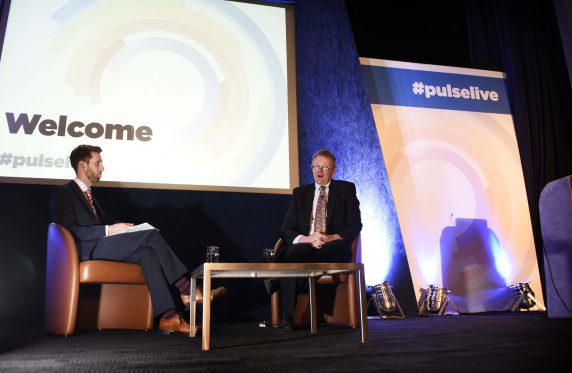Exclusive Training bosses cannot guarantee that there will be no cuts to the funding of GP trainers, following the news that Health Education England has to make swingeing savings.
But, speaking in an exclusive interview at the Pulse Live conference in London yesterday, HEE chief executive Professor Ian Cumming said there would be reduced funding for ‘back office’ functions only, and that the rationale was so that money can be put ‘back into the front line’.
But while he guaranteed that therefore GP trainees would not be facing any reduction in funding, he said he could not say the same for GP trainers.
He told conference delegates: ‘Now that I can’t guarantee, because we need to look at what we’re doing, how efficiently we’re doing it and whether or not whether or not there’s any scope for doing that better.’
He added: ‘But our key job is to produce doctors of the highest possible quality with the best possible training that we can. We aren’t going to sacrifice that.’
Mr Cumming further suggested that the news that the HEE budget is to be cut by 30% had been misunderstood by some people.
He said that the money HEE recieves to run the organisation was reduced by 25% in last year’s spending review, which he said ‘is the right thing to do’ to improve efficiency to be able to ‘put as much money as we can into our frontline activities’.
But HEE is also looking to make savings worth 30% in its educational support division, which supports the back office functions around recruiting trainees into training programs.
He said: ‘It isn’t 30% out of HEE budget. It is 30% out of how much money we spend as a back office function and as a support function to see how we can make that more efficient.’
But he reassured GPs that there would be no cuts to GP training.
He said: ‘If we fill the 3,250 GP training slots, we will spend £50m more on GP training than we did last year. So we’re certainly not taking money out of frontline training.’
HEE is responsible for hitting the Government’s target of putting an extra 5,000 GPs in the workforce by 2020. The organisation failed to meet their target of training 3,250 GPs per year by 2016.
But Mr Cumming said there needs to be a focus on retention as well as training because just training an increasing number of GPs is a ‘very inefficient way of trying to maintain the workforce’.
He said: ‘What we need to do is to make sure that we’re keeping the highly skilled, highly trained workforce that we’ve got and that we’re bringing in additional workforce to allow us to grow overall because … if we’re losing more and more GPs we can’t simply train more and more.’
Meeting the 5,000 GP target
In 2014, health secretary Jeremy Hunt announced the Conservative Party’s plans to ‘train and retain’ an extra 5,000 GPs by 2020.
However a Pulse investigation found that the DH will likely miss their target by more than half as the Government is on track to increase its primary care workforce by just 2,100, unless there are significant changes to the number of GPs joining and leaving the workforce.
In response, the DH said the 5,000 GPs would include doctors in training, watering down the promise by giving the Government three more years to hit their target.
To help make boost workforce numbers, Jeremy Hunt announced a £100m plan to make the NHS ‘self-sufficient’ by making doctors work in the NHS for four years after qualifying and increasing the number of medical school places by ‘up to a quarter’.
But the GP workforce fell by 96 GPs in the last year, despite ‘golden handshake’ schemes offering GPs £20,000 to work in some rural, remote or deprived parts of England.
NHS England also launched an overseas recruitment scheme worth £20m to bring 500 GPs over from Europe by 2020. GPs from Lithuania, Bulgaria, Poland and Spain are due to arrive in Lincolnshire and Essex next month, with more going to Hull later in the year.
Pulse October survey
Take our July 2025 survey to potentially win £1.000 worth of tokens














